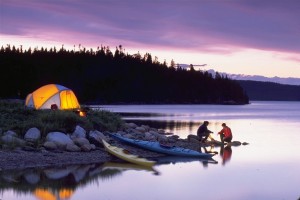Outdoor Recreation Industry Jobs Outnumber Those In Oil And Gas Nearly Three to One
 A new report from the Outdoor Industry Association released today shows that outdoor recreation is an enormous economic powerhouse. The report finds that 6.1 million American jobs are directly supported by the outdoor industry, as well as the fact that Americans spend $646 billion each year on activities like camping, hunting, and snow sports. This is a bigger economic impact than those of the pharmaceutical and gasoline and fuel industries.
A new report from the Outdoor Industry Association released today shows that outdoor recreation is an enormous economic powerhouse. The report finds that 6.1 million American jobs are directly supported by the outdoor industry, as well as the fact that Americans spend $646 billion each year on activities like camping, hunting, and snow sports. This is a bigger economic impact than those of the pharmaceutical and gasoline and fuel industries.America’s federal public lands and waters are a critical part of creating this economic boom. As the report explains:
From seashores and local parks to the wild backcountry, America’s public lands and waters are the very foundation of the national outdoor recreation system. Outdoor recreation can grow jobs and drive the economy if we manage and invest in parks, waters and trails as a system designed to sustain economic dividends for America.
Additionally, the study found that direct jobs in the outdoor recreation industry outnumber those in the oil and gas industry nearly three to one. While outdoor recreation supports 6.1 million direct jobs like manufacturing equipment, inventory managers, and retail, the oil and gas industry supports just 2.1 million direct jobs.
This contrast is interesting in light of the fact that tomorrow, the U.S. House of Representatives will be voting yet again on bills that would open more taxpayer lands to drilling, roll back public health protections, and punish citizens for raising concerns with the impacts of oil and gas leases on recreation and wildlife habitat. A separate report released this week found that this House has voted 109 times to enrich the oil and gas industry.
On the other hand, only a handful of bills to protect public lands and places to recreate outdoors have been approved by Congress, despite the fact that a number of such bills have been introduced by Republicans
This failure to protect locally-supported places may in part be explained by some conservatives’ ideological opposition to the very idea of public lands. For example, Utah Governor Gary Herbert (R) recently signed a law that demands Congress turn 30 million acres of federal lands over to the state by 2015 or it will sue, which could eventually result in them being mined or drilled.
And some members of Congress like Rep. Rob Bishop (R-UT) have continued to downplay the importance of protecting public lands to local economies. For example, Bishop stated last year that:
Contrary to claims by the administration and others, the designation of national monuments and wilderness are not a boon to local economies, but rather a detriment in most scenarios.
The Outdoor Industry Association’s report released today adds to the mounting evidence that land conservation is good for the economy. Other recent reports have shown that home values are higher closer to national wildlife refuges and that jobs in rural western counties with more than a third protected public lands have more than tripled over last 40 years.
You can return to the main Market News page, or press the Back button on your browser.

